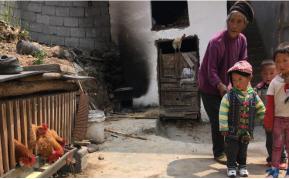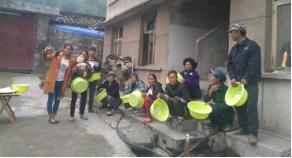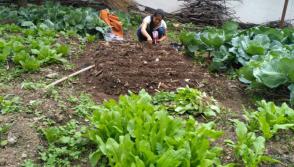Home \ Project News \ An Area Leader Tells His Story in CD Yuexi
CD Yuexi is a Community Development (CD) project funded by Baxter International Foundation. The main purpose of the project is to improve the health of 200 children through instigating better nutrition by supporting the children’s families in small scale crop production and animal husbandry and through providing health checks and referrals to health centers for children with health complications for treatment. The project also aims at building understanding and awareness of health, nutrition and hygiene to 1, 200 local families by establishing 40 “Health Action Self-help Groups.”

“The chicken are laying eggs everyday and my 3 grandchildren eat them but cannot finish.” said the grandmother.
The project recruits local people who are trained to work as Area Leaders. They live within the community and work together with the families and support them in improving their children’s nutrition, health, hygiene and sanitation through trainings and actions.
Here an Area Leader tells bout his experience in the field:
“My name is Wang Aga, I have worked for almost 1 and a half years as an Area Leader in Naituo Village under the Community Development project. Today the Project Leader, Bu Ziyiri and myself have been in the village visiting different households to check on how the egg laying chicken and vegetable productions are doing. We have so far visited 5 households and we observed that the chicken and vegetables are doing well and quinoa looks good too. This afternoon as we approached this other household, we saw a small girl of about 6 years. When she saw us her facial expression suddenly changed and she ran into the house. In a moment an old woman came out of the house. Her first introduction was that she is 73 years old. Her husband had passed on some forty years ago leaving behind 3 children, 2 boys and a girl who she took care of and that now they were grown up and married. She explained that due to life being so difficult all her children had gone out for migrant work leaving her behind with 3 children to take care of. We then explained that we had come to check on how the chicken were doing. Suddenly she held the Project Leader’s hand and said, “Thank you so much you kind hearted people, you have given me chicken, washing powder, soap, a washing basin, vegetable seeds and a lot of other things. Not only did you give us small chicks but you taught us how to feed and take care of them properly until they could lay eggs. Now the chicken are big and they lay eggs everyday and the three children eat but cannot finish them. Today I invite you for dinner so that you eat some.”

After a hygiene and sanitation training the villagers received washing basins.
Seeing the old women so happy and appreciating all that the project has done for her made me feel proud of our work. This shows that children who once lacked a source of nutritious food can now afford eggs everyday. I am happy to be contributing to the positive change of the community.”
At the beginning of the project in 2016, the project team together with the local village committees selected 200 families who could be assisted in improving their children’s nutrition. The project purchased chicks which were distributed to the 200 families with each family receiving 9 chicks and they were trained on how to take care of the chicks -the chicken are now laying eggs. The project also gave vegetable seeds to the families so that they could start vegetable gardens. All this has led to some positive results because now the 200 families have vegetable which in addition to eggs will help improve nutrition for the children. To help understand the health status of the children the project organized a health check for the 200 children in 2016 and the plan is to have another one in August 2017. From report in 2016 the results are that the overall incident rate of anemia measured as content of haemoglobin in the blood among children was 1.5%. However when it came to weight and height only 25% of the children reached the national standards of height for their age group. Only 9% of the children reached the national standards of height normal for their age group. This indicates that malnutrition is prevalent among the 200 children. 17 children had intestinal worms and they were referred to the local health institution for treatment.

The families received vegetable seeds from the project now they can add this to the eggs and make nutritious food for the children.
The project has also managed to reach out to 1, 302 households with different trainings in nutrition, health, hygiene and sanitation, agricultural skills and animal breeding. This half year of 2017, 322 trainings have so far been carried out with the Health Action Self-help Groups- (Households have been mobilized and organized into 40 groups). The trainings were mainly focused on improving the community’s nutrition, hygiene and agricultural skills. 68 cleaning actions have also been organized and carried out this half year which involved the 40 Health Action Self-help Groups and now the surroundings in the village are neat and clean.

The project is funded by the Baxter International Foundation (www.baxter.com).
The content in this article reflects the views of the authors and not necessarily those of the funder.